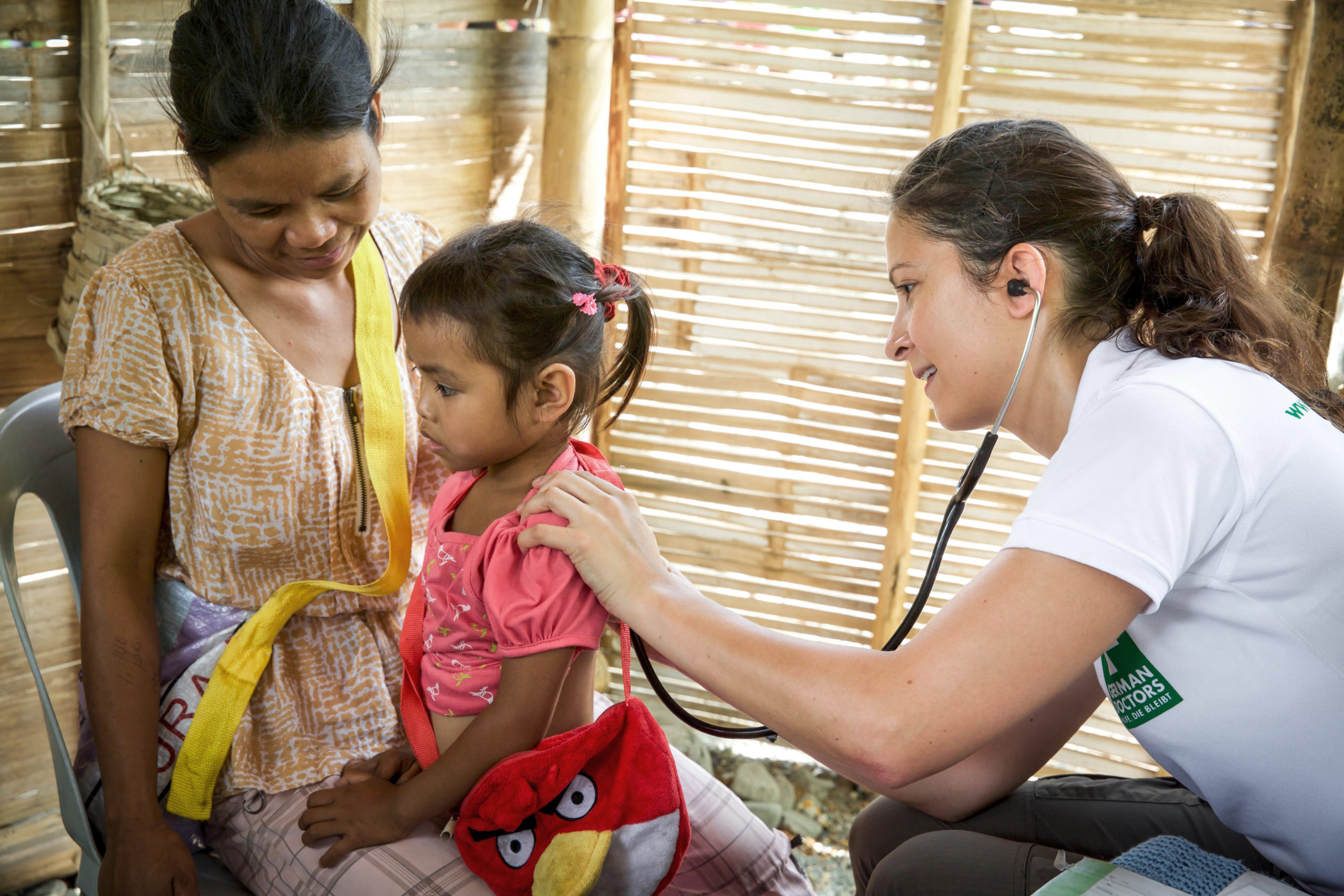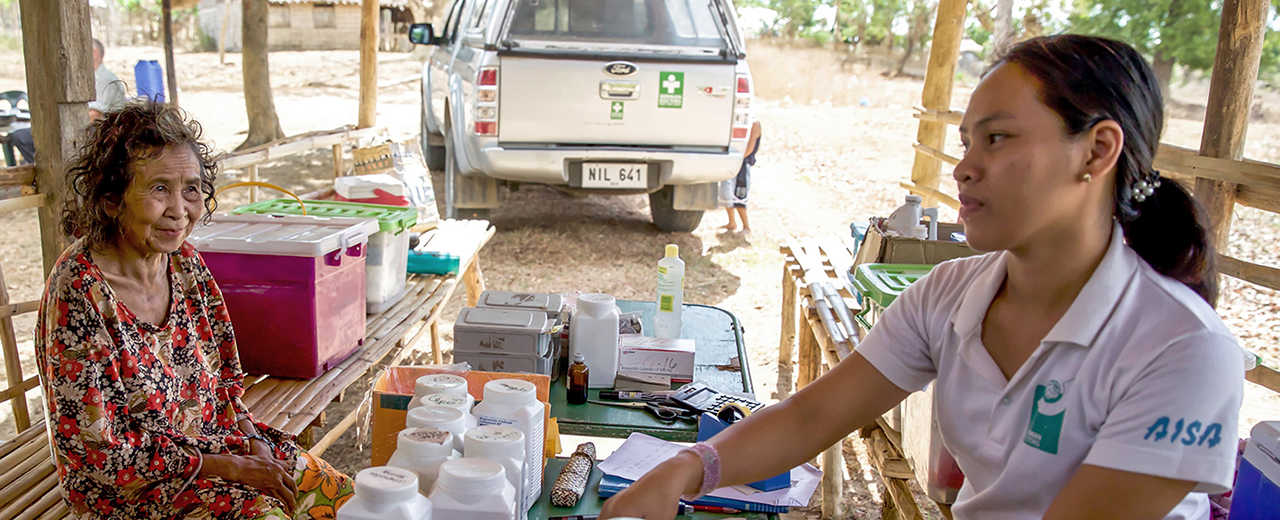 Coming together with people
Coming together with people
Philippines: Mobile medical aid in a remote mountain region
The little girl named Nieva looks cheerful and healthy when the Rolling Clinic makes a stop in the village. A health worker trained by the German Doctors has been looking after Nieva for the last four weeks, making sure she takes her medication correctly. When the Rolling Clinic medical team last visited, she was seriously ill. She lay apathetically in her mother's arms among the many waiting patients. The diagnosis was quickly made: Nieva had pneumonia. Pneumonia can generally be treated well. But in the impassable mountainous regions on the Philippine island of Mindoro, it can quickly become life-threatening. The way to the nearest doctor is arduous and expensive. Nieva's pneumonia has completely subsided, she is perfectly healthy again, the doctor notes. And Nieva is all smiles.
Necessity
Providing secure medical care for the indigenous Mangyan population in remote mountainous regions of Mindoro Island, the Philippines
Activity
Basic medical care for the Mangyans through the mobile clinic and training of local health workers
Countable effort
Number of minutes spent on the treatment of patients by the Rolling Clinic team and number of successfully trained health workers
Result
The health of these people has improved through more frequent examinations and treatment, and the trained health workers are strengthening the local health care system
Systemic effect
The improved health increases the quality of life and life expectancy of the Mangyans, and basic health care has been established and secured long-term
Background
Mindoro, a Philippine island barely 100 kilometres from the capital Manila as the crow flies, is home to about 1.3 million people. An estimated 275,000 of them belong to the indigenous Mangyan population (Philippine Statistic Authority, 2013). They live in seclusion in a traditional way as subsistence farmers or as unskilled labourers on farms.
In recent decades, immigrants from other Philippine islands have increasingly displaced them from the fertile coastal region to mountainous regions that are difficult to access (Helbing, J., 1996).
In the remote villages of the Mangyans, hardly any or only insufficient health services are offered (German Doctors, 2020). Therefore, severe illnesses such as pneumonia in children, skin diseases, worm infestations and severe diarrhoea are widespread. The government facilities are located in the lowlands, so the Mangyans have to travel a long way and wait a long time. This is because the lowlanders are given priority. Many Mangyans do not have a birth certificate, which puts them at an additional disadvantage. Only with this official document do they have access to social benefits such as health insurance or school attendance.
The “Rolling Clinic” project improves health care for the indigenous Mangyan population in the remote villages of Mindoro Island. It lowers the share of malnourished and undernourished children and reduces maternal and infant mortality. The simultaneous training of local health workers helps to ensure that basic medical care is also ensured in the long term.
The good deed
Today's donation will provide a child like little Nieva with medical care that she would otherwise find difficult to get in the remote regions. A Rolling Clinic team consists of a doctor, a translator and medical staff. The project serves up to 39 villages in the province of Oriental Mindoro 20 days per month. More than 100,000 people in the region benefit from this. The Rolling Clinic is able to provide over 20,000 treatments per year. In addition, 135 local health workers are trained and actively involved in the aid. They make an important contribution to health care. In the future, one health worker per 20 families will provide basic medical treatment in each village.

About the Philippines
Manila
Capital
111,046,910
Number of inhabitants
3,548.8
Gross domestic product per capita per year
Rang 116 von 191
Human Development Index
By far, the majority of nurses working abroad come from the Philippines. Worldwide, about 11 million Filipinas and Filipinos work abroad, about 25% of them in the medical sector. Besides nurses, engineers, teachers, cooks and other professionals are also sent abroad.
About the organization and further information
Association
German Doctors e.V.
Website
https://www.german-doctors.de/de/


Further information and source
- Bociaga, Robert, 2020: For the Philippines’ Mangyans, COVID-19 extends a long history of discrimination, veröffentlicht in news.mongobay.com, abgerufen am 28.03.2022
- German Doctors, 2020: Rolling Clinic Evaluation Report Mindoro
- Hebling, Jürg, 1996: Verwandtschaft, Macht und Produktion: Die Alangan-Mangyan im Nordosten Mindoros. Berlin
- National Statistics Office, 2013: 2010 Census of Population and Housing, Report No. 2A – Demographic and Housing Characteristics (Non-Sample Variables), Oriental Mindoro, Manila
- Philippine Statistics Authority (PSA) and ICF. 2018. Philippines National Demographic and Health Survey 2017. Quezon City, Philippines, and Rockville, Maryland, USA: PSA and ICF




